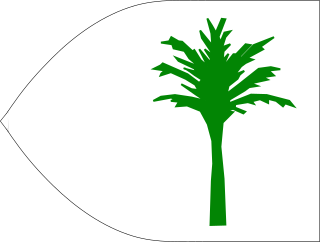
The Kanem–Bornu Empire existed in areas which are now part of Nigeria, Niger, Cameroon, Libya and Chad. It was known to the Arabian geographers as the Kanem Empire from the 8th century AD onward and lasted as the independent kingdom of Bornu until 1900.
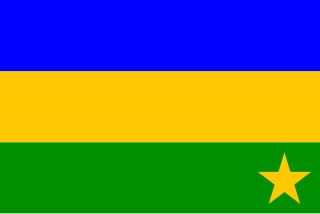
The Kanuri people are an African ethnic group living largely in the lands of the former Kanem and Bornu Empires in Niger, Nigeria, Chad, and Cameroon, as well as a diaspora community residing in Sudan. Those generally termed Kanuri include several subgroups and dialect groups, some of whom identify as distinct from the Kanuri. Most trace their origins to ruling lineages of the medieval Kanem–Bornu Empire, and its client states or provinces. In contrast to the neighboring Toubou or Zaghawa pastoralists, Kanuri groups have traditionally been sedentary, engaging in farming, fishing the Chad Basin, trade, and salt processing.

Borno State is a state in the North-East geopolitical zone of Nigeria.It is bordered by Yobe to the west for about 421 km, Gombe to the southwest for 93 km, and Adamawa to the south while its eastern border forms part of the national border with Cameroon for about 426 km. Its northern border forms part of the national border with Niger for about 223 km, mostly across the Komadougou-Yobe River, and its northeastern border forms all of the national border with Chad for 85 km ,.It is the only Nigerian state to border up to three countries. It takes its name from the historic emirate of Borno, with the emirate's old capital of Maiduguri serving as the capital city of Borno State. The state was formed in 1976 when the former North-Eastern State was broken up. It originally included the area that is now Yobe State, which became a distinct state in 1991.

Rabih az-Zubayr ibn Fadl Allah or Rabih Fadlallah, usually known as Rabah in French, was a Sudanese warlord and slave trader who established a powerful empire east of Lake Chad, in today's Chad.
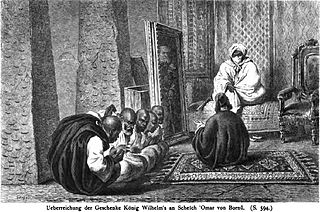
Umar I ibn Muhammad al-Amin or Umar of Borno was Shehu (Sheik) of the Kanem–Bornu Empire and son of Muhammad al-Amin al-Kanemi.

Shehu Muhammad al-Amîn ibn Muhammad al-Kanemi (1776–1837) was an Islamic scholar, teacher, religious and political leader who advised and eventually supplanted the Sayfawa dynasty of the Kanem–Bornu Empire. In 1846, al-Kanemi's son Umar I ibn Muhammad al-Amin became the sole ruler of Borno, an event which marked the end of the Sayfawa dynasty's eight hundred year rule. The current Shehu of Bornu, a traditional ruler whose seat remains in modern Borno State, Nigeria, is descended from al-Kanemi.
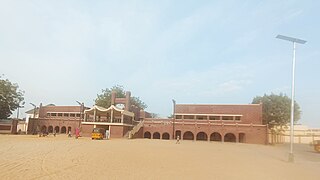
The Borno Emirate or Sultanate, sometimes known as the Bornu Emirate, is a traditional Nigerian state that was formed at the start of the 20th century. It is headed by the descendants of the rulers of the Bornu Empire, founded before 1000. The rulers have the title Shehu of Borno. The traditional emirate of Borno maintains a ceremonial rule of the Kanuri people, based in Maiduguri, Borno State, Nigeria, but acknowledged by the 4 million Kanuri in neighbouring countries.
Dikwa is a town and a local government area in Borno State, Nigeria.

Abu Bakr bin Ibrahim al-Kanemi CBE, was the Shehu of Bornu from 1902 to 1922.
The Dikwa Emirate is one of the successor states to the old Bornu Empire, a traditional state within Borno State, Nigeria. It was established in 1901 at the start of the colonial period after the Bornu empire had been partitioned between the British, French and Germans.
Bukar or Bukar Kura bin Umar al-Kanemi was Shehu of Borno from 1881 to c. 1884.
Ibrahim or Ibrahim bin Umar al-Kanemi was Shehu of Borno from c. 1884 to c. 1885.
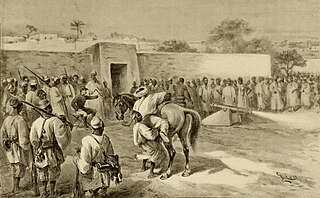
Ashimi or Hashim bin Umar al-Kanemi (1840s-1893) was Shehu of Borno from ca.1885 to 1893.
Kyari or Khair bin Bukhar al-Kanemi (?-1894) was Shehu of Borno in 1893–1894.

Sir Umar Ibn Muhammad (1872–1967), also known as Sanda Kyarimi, was Shehu of Dikwa between 1922 and 1937 and Shehu of Borno from 1937 to 1967.

Shehu Mustafa Ibn Umar El-Kanemi was the Shehu of Borno from 1974 to 2009.
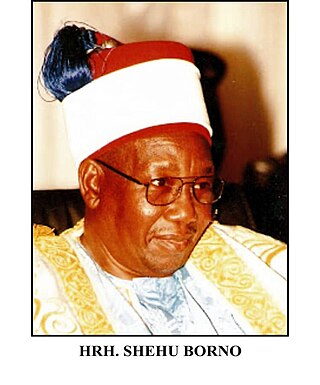
Abubakar Ibn Umar Garba Al Amin El-Kanemi Shehu Of Borno is the Shehu, or traditional ruler, of the Borno Emirate in northeast Nigeria.
Sanda Wuduroma, or Abu Sanda bin Buqar al-Kanemi, (?-1894) was Shehu of Borno in 1894.
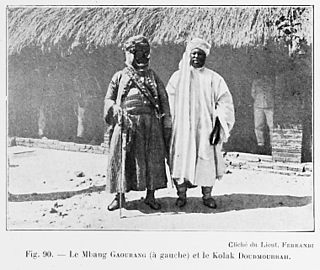
Abd ar-Rahman Gaourang II was Mbang of Bagirmi from 1885 to 1918. He came to power at a time when the sultanate was in terminal decline, subject to both Wadai and Bornu. The Sudanese warlord Rabih az-Zubayr made him his vassal in 1893. Gaourang signed a treaty that made his sultanate a French protectorate in 1897. After the final defeat of Rabih in 1900 he ruled as a subordinate of the French in Chad until his death in 1918.

Muhammadu Mai Maina (1874–1964) was the first chief of Askira. He worked as an interpreter for the Northern Nigeria colonial government from 1895 to 1913, when he was appointed Chief of the Margi District in Bornu. In 1917, he resigned from this position and worked as a trader in Potiskum. Later, he founded the town of Askira and was appointed its chief in 1921, a position he held for over forty years. In 1958, he published Labarin Maimaina Na Jega, Sarkin Askira, a memoir about his early career as an interpreter. In 1961, he became a member of the Northern Region House of Chiefs.
















